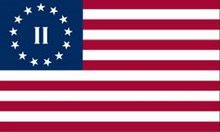When looking for information on the role of the minutemen in American colonial history, I came across the following piece on the minutemen. I was surprised to find out that the minutemen had a larger role than they fulfilled in the War for Independence. To compare them with our modern warriors, we could call them the colonial special ops units.
The article below, is from the website of ushistory.org, created and hosted by the Independence Hall Association in Philadelphia, PA. The site is a treasure trove of early American history. Here is a link to their website: ushistory.org.
The article, Minutemen, written by Andrew Ronemus, is found at this web address: ushistory–minutemen.
MinutemenThis material is copyright by, and used with permission of, the Independence Hall Association, on the web at ushistory.org.The Minutemen playing a crucial role not only in the Revolutionary War, but in earlier conflicts.
Although the terms militia and minutemen are sometimes used interchangeably today, in the 18th century there was a decided difference between the two. Militia were men in arms formed to protect their towns from foreign invasion and ravages of war. Minutemen were a small hand-picked elite force which were required to be highly mobile and able to assemble quickly. Minutemen were selected from militia muster rolls by their commanding officers. Typically 25 years of age or younger, they were chosen for their enthusiasm, reliability, and physical strength. Usually about one quarter of the militia served as Minutemen, performing additional duties as such. The Minutemen were the first armed militia to arrive or await a battle.
Although today Minutemen are thought of as connected to the Revolutionary War in America, their existence was conceived in Massachusetts during the mid-seventeenth century. As early as 1645, men were selected from the militia ranks to be dressed with matchlocks or pikes and accoutrements within half an hour of being warned. In 1689 another type of Minuteman company came into existence. Called Snowshoemen, each was to "provide himself with a good pair of snowshoes, one pair of moggisons, and one hatchet" and to be ready to march on a moment's warning. Minutemen also played a role in the French and Indian War in the 1750's. A journal entry from Samuel Thompson, a Massachusetts militia officer, states, "...but when our men were gone, they sent eleven more at one minute's warning, with 3 days provision..." By the time of the Revolution, Minutemen had been a well-trained force for six generations in the Massachusetts Bay Colony. Every town had maintained its 'training band'. The adversity that this region faced — Native-American uprisings, war with France, and potential for local insurrections, social unrest, and rioting — provided ample reason to adhere to a sound militia organization. In his recent book, perhaps David Hackett Fischer puts it best, "The muster of the Minutemen in 1775 was the product of many years of institutional development...it was also the result of careful planning and collective effort." (p. 151). By the time of the Revolution, Massachusetts had been training, drilling, and improving their militia for well over a hundred years.
Unfortunately, one thing the Minutemen lacked was central leadership. This disadvantage would lead to their dissolution. In February of 1775 Concord was one of the first towns to comply with the order to create Minutemen companies out of the militia. Of approximately 400 militia from Concord's muster rolls, one hundred would also serve as Minutemen. When a battle took place Minutemen companies from several towns combined their units. An officer from the 43rd Regiment of Foot was sent to the North Bridge in Concord with a number of light infantry. Minutemen from Concord, Acton, Littleton, and other towns combined forces. After a few volleys were fired, the British light infantry retreated back to the Concord Common area. Lacking central command, with each company of Minutemen loyal to their own town, they did not pursue the redcoats. In the running battle that ensued fifteen miles back to Boston the Massachusetts militia would see their last action as Minutemen in history. The militia would go on to form an army, surrounding Boston and inflicting heavy casualties on the British army at Bunker and Breed's Hill.
Thus, although lacking central command, the Minutemen were still better organized and battle-tested than any other part-time military. They were a vital and necessary force, playing a crucial role in not only the Revolutionary War, but in earlier conflicts. Without these "ready in a minute" men, our history may have been written in a very different way.
– Andrew Ronemus
Picture courtesy of ushistory.org
Story courtesy of ushistory.org

